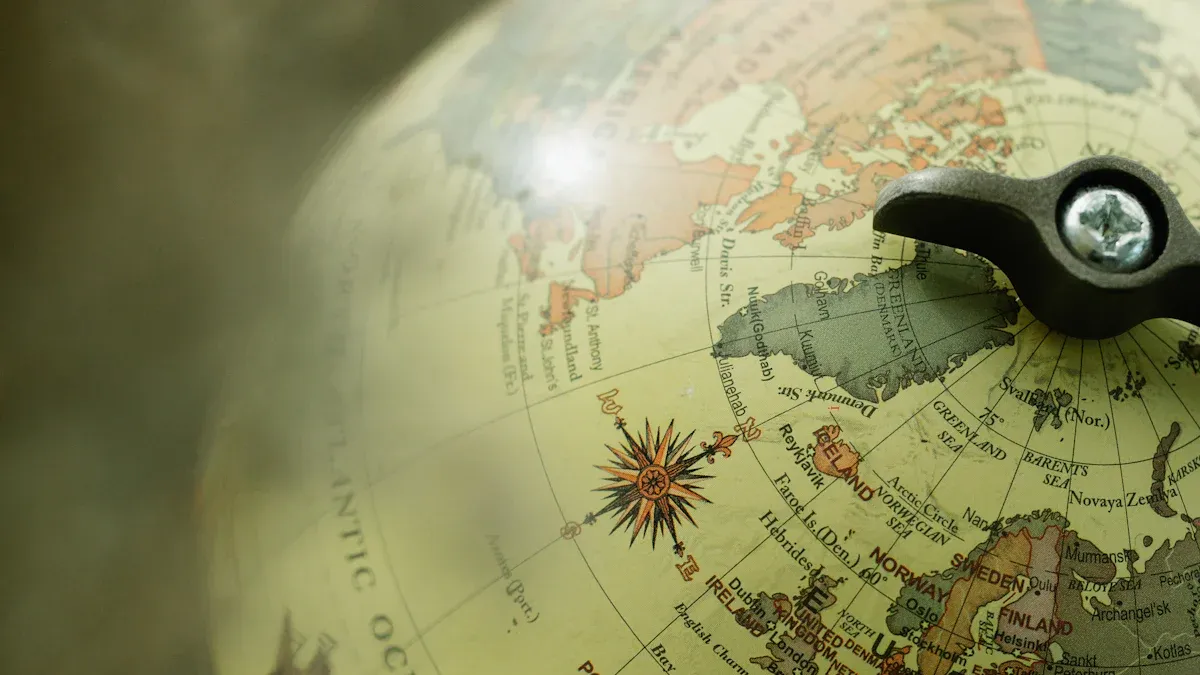
The Belt & Road initiative connects diverse nations, each facing unique challenges that demand innovative solutions. Countries like Pakistan, Kenya, and Indonesia exhibit a significant DNA equipment demand to tackle critical issues such as energy deficits, environmental degradation, and industrial pollution. Addressing these needs fosters sustainable development and strengthens international collaboration.
Key Takeaways
- Countries in the Belt & Road plan have special problems, like not enough energy and harm to the environment. DNA tools can help solve these problems in new ways.
- Using DNA tools in farming and healthcare can improve work, cut waste, and support eco-friendly habits. This helps economies grow.
- Using DNA tools fixes current problems and builds teamwork between countries. It also helps them grow together, matching the Belt & Road plan’s goals.
Pakistan
Addressing Energy Deficits with DNA Equipment
Pakistan faces significant energy challenges, with frequent power outages disrupting daily life and industrial operations. The country’s growing population and expanding economy have increased the strain on its energy infrastructure. DNA equipment plays a pivotal role in addressing these deficits. Advanced ultrasonic crushing instruments and high-pressure homogenization technologies can optimize energy production processes, particularly in renewable energy sectors like biofuels. These tools enhance efficiency by breaking down complex materials into usable forms, reducing waste and maximizing output.
The DNA equipment demand in Pakistan stems from the need to modernize energy systems. By integrating innovative solutions, the country can reduce its reliance on traditional energy sources. This shift not only improves energy availability but also supports environmental sustainability. The adoption of such technologies aligns with Pakistan’s goals under the Belt & Road initiative, fostering economic growth and regional collaboration.
Overcoming Infrastructure Challenges
Pakistan’s infrastructure requires significant upgrades to meet the demands of its urban and rural populations. Roads, bridges, and public utilities often struggle to support the country’s rapid development. DNA equipment offers solutions to these challenges. For instance, industrial anti-scaling and descaling equipment can improve the efficiency of water and energy systems, ensuring uninterrupted services.
The DNA equipment demand also extends to construction and maintenance. Ultrasonic dispersion technologies can enhance the durability of construction materials, reducing costs and increasing longevity. By addressing these infrastructure gaps, Pakistan can create a more resilient foundation for its economic and social progress.
Kazakhstan
Tackling Environmental Degradation
Kazakhstan faces severe environmental challenges, particularly in its agricultural sector, which spans 84.5 million hectares. Unsustainable land practices have led to widespread land degradation and desertification, especially in ecologically sensitive areas near the Aral and Caspian Seas. Soil contamination from pollutants like oil products and heavy metals further exacerbates these issues. These environmental problems threaten the country’s ecological balance and agricultural productivity.
DNA technologies offer innovative solutions to combat these challenges. For instance, advanced ultrasonic crushing instruments can aid in soil remediation by breaking down pollutants into less harmful components. Additionally, molecular biology instruments can help monitor and restore soil health by analyzing microbial activity. The use of NDVI data from Landsat satellites in East Kazakhstan highlights the variability in ecosystems, emphasizing the need for targeted interventions. By integrating DNA equipment into sustainable land management practices, Kazakhstan can enhance ecological resilience and mitigate the effects of environmental degradation.
Modernizing Technology with DNA Solutions
Kazakhstan’s growing interest in biotechnology and genomic analysis underscores its readiness to adopt advanced DNA equipment. The country has a diverse range of disease strains and an underutilized scientific workforce, creating opportunities for innovation in disease research. Recent intergovernmental programs aim to improve disease surveillance networks and diagnostic laboratories, which are essential for the effective use of DNA technologies.
The adoption of DNA solutions can also accelerate progress in drug and vaccine development. Positive research outcomes from modern biotechnology approaches demonstrate the potential for DNA equipment to revolutionize healthcare and scientific research in Kazakhstan. This modernization aligns with the country’s goals under the Belt & Road initiative, fostering technological advancement and addressing the increasing DNA equipment demand.
Sri Lanka
Managing Economic Instability
Sri Lanka faces persistent economic instability due to high debt levels, inflation, and limited foreign reserves. These challenges hinder the country’s ability to invest in critical sectors like healthcare, agriculture, and infrastructure. DNA equipment offers innovative solutions to address these issues by enhancing productivity and reducing operational costs.
For instance, ultrasonic crushing instruments can optimize agricultural processes by improving the extraction of essential oils and bioactive compounds. This technology enables farmers to produce high-value products for export, boosting foreign exchange earnings. Additionally, freeze-drying equipment can preserve perishable goods, reducing post-harvest losses and ensuring food security. These advancements contribute to economic stability by creating new revenue streams and reducing dependency on imports.
The integration of DNA technologies into Sri Lanka’s industries aligns with its goals under the Belt & Road initiative. By leveraging these tools, the country can strengthen its economic foundation and foster sustainable growth.
Reducing Dependence on External Resources
Sri Lanka relies heavily on imported goods and energy, which strains its economy and increases vulnerability to global market fluctuations. DNA equipment can help reduce this dependence by promoting self-sufficiency in key sectors.
In the energy sector, high-pressure homogenization technologies can enhance the production of biofuels, providing a renewable alternative to imported fossil fuels. Molecular biology instruments can support local research and development, enabling the creation of innovative solutions tailored to Sri Lanka’s unique needs. These advancements empower the country to utilize its natural resources more effectively, reducing reliance on external suppliers.
By adopting DNA technologies, Sri Lanka can achieve greater economic independence and resilience, ensuring long-term prosperity and stability.
Kenya

Bridging Urbanization Gaps with DNA Equipment
Kenya’s rapid urbanization has created significant disparities in development, particularly in informal settlements. These areas face critical challenges, including food insecurity, unemployment, and limited access to healthcare.
- Nearly 75% of households in informal settlements skip meals regularly.
- Almost 50% have lost their income.
- About 10% forgo essential health services, such as malaria treatment and immunization.
The integration of DNA equipment can help bridge these gaps by enhancing resource management and service delivery. For instance, ultrasonic crushing instruments can optimize food production processes, ensuring better nutrition for vulnerable populations. Molecular biology instruments can support healthcare initiatives by improving disease diagnostics and monitoring. These technologies enable targeted interventions, addressing the unique needs of urban communities. By adopting such solutions, Kenya can reduce urbanization disparities and improve the quality of life for its citizens.
Improving Public Health and Sanitation
Public health and sanitation remain pressing concerns in Kenya, particularly in areas with inadequate infrastructure. Overcrowding and limited access to clean water contribute to the spread of infectious diseases. DNA equipment offers innovative solutions to these challenges. Molecular biology instruments can analyze water samples to detect contaminants, ensuring safer drinking water. Ultrasonic dispersion technologies can enhance the efficiency of water treatment processes, reducing the prevalence of waterborne diseases.
| Evidence Type | Description |
|---|---|
| Waterborne Diseases | Kenya faces significant challenges with waterborne diseases, linked to inadequate sanitation. |
| Sanitation Infrastructure | Improved sanitation infrastructure correlates with reduced disease incidence. |
| Behavior Change | Practices like handwashing with soap effectively reduce the spread of viral infections. |
By integrating DNA solutions into public health strategies, Kenya can improve sanitation infrastructure and promote healthier behaviors. These advancements align with the growing DNA equipment demand, supporting sustainable development and public well-being.
Ethiopia
Enhancing Agricultural Productivity
Ethiopia’s economy depends heavily on agriculture, which provides food and raw materials for industries. However, agricultural productivity remains low despite numerous improvement programs. DNA equipment offers transformative solutions to address these challenges. Advanced molecular biology instruments can assist in developing genetically modified (GM) crops tailored to Ethiopia’s unique climate and soil conditions. These crops can withstand drought, pests, and diseases, ensuring higher yields and better food security.
- Key agricultural insights:
- GM crops have demonstrated a 21% increase in yield.
- Pesticide usage has decreased by 37%, showcasing the potential for sustainable farming practices.
Ultrasonic crushing instruments can also optimize the extraction of bioactive compounds from crops, enabling farmers to produce high-value products for export. This approach not only boosts income but also reduces reliance on traditional farming methods. By integrating DNA technologies, Ethiopia can modernize its agricultural sector, ensuring long-term sustainability and economic growth.
Solving Water Scarcity Issues
Water scarcity poses a significant challenge to Ethiopia’s development. Limited access to clean water affects agriculture, public health, and overall quality of life. DNA equipment provides innovative solutions to address this issue. Molecular biology instruments can analyze water samples to detect contaminants, ensuring safer drinking water for communities. Ultrasonic dispersion technologies enhance water treatment processes, making them more efficient and cost-effective.
Note: Improved water management directly impacts agricultural productivity and public health, creating a ripple effect of positive outcomes.
By adopting DNA technologies, Ethiopia can tackle water scarcity effectively, supporting its agricultural and industrial sectors while improving the well-being of its population.
Indonesia
Conserving the Environment with DNA Technology
Indonesia, home to some of the world’s most biodiverse rainforests, faces significant environmental challenges. Illegal logging and deforestation threaten its tropical ecosystems, impacting global climate stability. DNA technology offers innovative solutions to address these issues. For instance, DNA fingerprinting is being utilized to combat illegal logging. This advanced method helps verify the legality of tropical timber harvests, ensuring compliance with international trade laws. Organizations such as Double Helix Tracking and Biodiversity International actively implement these technologies to promote sustainable forestry practices.
By integrating DNA equipment like molecular biology instruments, Indonesia can monitor and protect its natural resources more effectively. These tools enable precise identification of plant species, aiding in the conservation of endangered flora. Additionally, ultrasonic crushing instruments can assist in extracting bioactive compounds from plants, supporting the development of eco-friendly products. These advancements align with Indonesia’s environmental goals under the Belt & Road initiative, fostering sustainable practices and preserving biodiversity.
Managing Overpopulation and Urban Development
Indonesia’s rapid population growth and urbanization present complex challenges. Overcrowded cities strain infrastructure, leading to issues such as inadequate housing, traffic congestion, and waste management problems. DNA technology can play a pivotal role in addressing these concerns. Molecular biology instruments can support urban planning by analyzing environmental data, enabling more efficient resource allocation.
Ultrasonic dispersion technologies can enhance waste treatment processes, reducing pollution in urban areas. These tools also improve water purification systems, ensuring access to clean water for growing populations. By adopting DNA solutions, Indonesia can manage urban development more sustainably, improving living conditions and supporting long-term economic growth.
Bangladesh
Mitigating Climate Change Impacts
Bangladesh faces severe challenges from climate change due to its low-lying geography and high population density. Rising sea levels, frequent cyclones, and unpredictable weather patterns threaten agriculture, infrastructure, and livelihoods. DNA equipment offers innovative solutions to mitigate these impacts and build resilience.
Molecular biology instruments can play a critical role in developing climate-resilient crops. These tools enable researchers to identify and modify genes that enhance drought tolerance, salt resistance, and pest resilience in staple crops like rice. This advancement ensures food security for millions of people. Additionally, ultrasonic crushing instruments can optimize the extraction of biofuels from organic materials, reducing the country’s dependence on fossil fuels and lowering greenhouse gas emissions.
Tip: Investing in DNA technologies can help Bangladesh adapt to climate change while promoting sustainable development.
By integrating these solutions, Bangladesh can address the immediate effects of climate change and prepare for long-term environmental challenges.
Addressing Industrial Pollution
Industrial pollution poses a significant threat to Bangladesh’s environment and public health. Textile and leather industries, which contribute significantly to the economy, release harmful chemicals into water bodies and the atmosphere. DNA equipment provides effective tools to tackle this issue.
Ultrasonic dispersion technologies can enhance wastewater treatment processes by breaking down pollutants into less harmful components. Molecular biology instruments can monitor water quality by detecting contaminants at a molecular level, ensuring compliance with environmental standards. These technologies also support the development of eco-friendly industrial practices, reducing the environmental footprint of manufacturing processes.
| Pollution Source | Impact | DNA Solution |
|---|---|---|
| Textile Industry | Water contamination | Ultrasonic dispersion for treatment |
| Leather Industry | Toxic chemical discharge | Molecular analysis for pollutant control |
Adopting DNA technologies allows Bangladesh to balance industrial growth with environmental sustainability, ensuring a healthier future for its citizens.
Uzbekistan
Transitioning to Sustainable Energy
Uzbekistan, a country rich in natural gas reserves, is actively seeking to transition to sustainable energy sources. Its reliance on fossil fuels has led to environmental challenges and economic vulnerabilities. DNA equipment offers innovative solutions to accelerate this transition. High-pressure homogenization technologies can optimize biofuel production by breaking down organic materials into usable forms. This approach reduces waste and enhances energy efficiency.
The integration of molecular biology instruments can also support research into renewable energy sources. These tools enable scientists to study and develop bioengineered organisms capable of producing cleaner energy. By adopting such technologies, Uzbekistan can diversify its energy portfolio and reduce its carbon footprint. This shift aligns with the country’s goals under the Belt & Road initiative, fostering environmental sustainability and energy independence.
Diversifying the Economy with DNA Equipment
Uzbekistan’s economy relies heavily on agriculture and natural resources. Diversification is essential to ensure long-term economic stability. DNA equipment plays a crucial role in achieving this goal. Ultrasonic crushing instruments can enhance the extraction of valuable compounds from agricultural products, creating opportunities for high-value exports. Freeze-drying equipment can preserve perishable goods, reducing post-harvest losses and increasing marketability.
The growing DNA equipment demand reflects Uzbekistan’s commitment to modernizing its industries. Molecular biology instruments can support research in pharmaceuticals and biotechnology, opening new avenues for economic growth. By leveraging these technologies, Uzbekistan can build a more resilient and diversified economy, ensuring sustainable development for future generations.
Egypt

Managing Water Resources Effectively
Egypt faces critical water resource challenges due to its reliance on the Nile River, which supplies over 90% of the country’s freshwater. Rapid population growth and climate change have intensified water scarcity, threatening agriculture, industry, and daily life. DNA equipment offers innovative solutions to address these pressing issues. Molecular biology instruments can analyze water samples to detect contaminants, ensuring safer drinking water for communities. Ultrasonic dispersion technologies enhance water treatment processes, improving efficiency and reducing waste.
Efficient water management also supports agricultural productivity. Advanced DNA technologies can help develop drought-resistant crops, reducing the strain on water resources. These tools enable Egypt to optimize its irrigation systems, ensuring sustainable water use in farming. By integrating DNA equipment into water resource management, Egypt can mitigate the impacts of water scarcity and secure a stable future for its population.
Supporting Urban Expansion with DNA Solutions
Urban expansion in Egypt has created significant challenges, including overcrowding, inadequate infrastructure, and environmental degradation. DNA equipment provides effective tools to support sustainable urban development. Ultrasonic crushing instruments can optimize construction materials, enhancing their durability and reducing costs. Molecular biology instruments can monitor air and water quality in urban areas, ensuring healthier living conditions.
The growing DNA equipment demand reflects Egypt’s commitment to modernizing its urban infrastructure. These technologies enable efficient waste management and pollution control, addressing the environmental impacts of urbanization. By adopting DNA solutions, Egypt can balance rapid urban growth with sustainability, improving the quality of life for its citizens and supporting long-term development goals.
Turkey
Balancing Economic Growth and Sustainability
Turkey has made significant strides in balancing economic growth with sustainability by investing in biotechnology and genetic research. The establishment of research centers and laboratories dedicated to genetic engineering highlights the country’s commitment to advancing this sector. These initiatives, supported by international funding, provide a strong foundation for integrating DNA equipment into various industries.
The Ministry of Environment, along with other governmental bodies, plays a pivotal role in managing biological diversity and genetic resources. An Inter-Ministerial Steering Committee coordinates national efforts to conserve genetic biodiversity. These actions align with Turkey’s broader economic strategies, which emphasize sustainable practices.
- Key initiatives include:
- Funding biotechnology projects to enhance research capabilities.
- Establishing advanced laboratories for genetic analysis.
- Promoting collaboration between ministries to protect biodiversity.
DNA equipment, such as molecular biology instruments and ultrasonic crushing tools, can further these efforts. These technologies enable efficient resource utilization, reduce waste, and support eco-friendly industrial practices. By adopting such solutions, Turkey can achieve sustainable economic growth while preserving its natural resources.
Overcoming Geopolitical Challenges with DNA Technology
Turkey’s strategic location at the crossroads of Europe and Asia presents unique geopolitical challenges. These include managing cross-border trade, addressing regional conflicts, and ensuring energy security. DNA technology offers innovative solutions to mitigate these issues.
For instance, molecular biology instruments can enhance food safety by detecting contaminants in agricultural exports. This ensures compliance with international trade standards, strengthening Turkey’s position in global markets. Ultrasonic dispersion technologies can optimize water treatment processes, addressing water scarcity concerns in border regions.
Note: Advanced DNA tools also support energy diversification by improving biofuel production, reducing reliance on imported fossil fuels.
By leveraging DNA technology, Turkey can navigate its geopolitical challenges effectively. These advancements not only bolster economic resilience but also promote regional stability and cooperation.
The top 10 countries along the Belt & Road initiative face diverse challenges, from energy deficits to environmental degradation. Addressing these issues requires innovative solutions. DNA breakers play a crucial role in meeting the growing DNA equipment demand, enabling nations to modernize industries, improve resource management, and foster sustainable development. These technologies pave the way for innovation and long-term growth.
FAQ
What is DNA equipment, and why is it important?
DNA equipment includes tools like ultrasonic crushers and molecular biology instruments. These devices optimize processes in energy, agriculture, and healthcare, driving innovation and sustainability.
How does DNA technology support the Belt & Road initiative?
DNA technology addresses challenges like energy deficits, environmental degradation, and urbanization. It modernizes industries, improves resource management, and fosters sustainable development across participating countries.
Which industries benefit most from DNA equipment?
Industries like agriculture, healthcare, energy, and manufacturing benefit significantly. DNA equipment enhances efficiency, reduces waste, and supports the development of eco-friendly and innovative solutions.
Post time: Apr-08-2025





